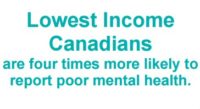Income support and poverty reduction
 Income is an important social determinant of health. There is a large body of evidence that illustrates the causal effect between income and health. Those with lower incomes generally report poorer physical and mental health than those in the higher income quintiles. According to Statistics Canada, Canadians in the lowest-income bracket are three to four times more
Income is an important social determinant of health. There is a large body of evidence that illustrates the causal effect between income and health. Those with lower incomes generally report poorer physical and mental health than those in the higher income quintiles. According to Statistics Canada, Canadians in the lowest-income bracket are three to four times more
likely than those in the highest-income bracket to say that their mental health is fair to poor. Without access to quality employment many people rely on income supports from social assistance, which are inadequate to maintain a decent standard of living. Similarly, access to an employment service provider specializing in employment supports for persons with mental health conditions can help increase the changes of gaining employment that is meaningful to the job seeker and pays a competitive wage.
CMHA Ontario, along with numerous organizations and provincial networks, has long called for poverty reduction strategies that increase access to economic and community supports for vulnerable populations. CMHA Ontario is active in supporting people with mental health and addiction issues to reduce their risk of living in poverty. We do this by advocating for increases in supportive housing, effective employment support programs and equitable income support policies, such as the Ontario Disability Support Program (ODSP).
Income support and mental health
It is well recognized that for many people with mental health disabilities, the Ontario Disability Support Program (ODSP) is their first and only source of income. According to the latest estimates (2015) by the Ministry of Community and Social Services, approximately 45% of all current recipients of ODSP have a mental health disability.
ODSP policies have a huge impact on people with lived experience of mental health and addictions issues (PWLE). Stakeholders acknowledge that current income support policies under ODSP are not working to support PWLE to encourage participation in the workforce and existing policies may be achieving the reverse effect.
Research studies have shown that the fear of losing disability benefits was one of the key barriers to obtaining and maintaining employment for clients with severe mental illnesses. In other words, current income support policies that deduct additional earnings serve as a major disincentive for people to want to work more, or in some cases to even want to seek employment. Inadequacy of current ODSP levels to adequately address basic needs like food, shelter and transportation are other barriers and often linked to systemic poverty. Current income levels are not enough to live successfully in the community.
Income Support Government initiatives
September 30, 2020: Ontario Modernizes Social Assistance to Help More People Re-enter the Workforce
The initial phase of the plan included these new measures:
- Enhanced Access to Employment and Training
- Accelerating Digital Delivery
- Centralized and Automated Delivery
- Risk-based Eligibility Reviews
- Collaborating with Partners
November 26, 2020: Ontario Modernizing Application Process for Social Assistance
The Ontario government launched a new, easy to use, online application and streamlined process to apply for social assistance, providing critical financial supports to those affected by COVID-19. These advancements are being prototyped in
- Hamilton,
- York Region,
- Chatham-Kent, D
- istrict of Parry Sound,
- Durham,
- Greater Sudbury, and
- County of Renfrew.
The centralized intake process is designed to make processing of applications more quickly and reduce time-consuming paperwork for caseworkers, giving them more time to support their clients and help them get back to work.
December 16, 2020: Ontario Unveils New Comprehensive Plan to Combat Poverty
The Ontario government released its new Poverty Reduction Strategy which is designed to help more people get back to work and participate in the province’s economic recovery from COVID-19. The five-year strategy outlines key initiatives that will help connect people experiencing poverty with education, skills training, health and other supports, while helping people keep more of their hard-earned money. The new strategy Building a Strong Foundation for Success: Reducing Poverty in Ontario was developed after extensive consultation, including an online survey and engagement with Indigenous partners and municipal committees. It is focused on:
- Encouraging job creation and connecting people to employment
- Connecting people with the right supports and services
- Making life more affordable and building financial resiliency
- Accelerating action and driving progress
As part of its Recovery and Renewal Plan announced in Fall 2020, the province worked with municipalities to design a Vision for Social Assistance Transformation to ensure people are getting the right supports at the right time so they can re-enter the workforce. The vision outlines plans for a new social assistance delivery model that allows frontline workers to focus on results for people rather than paperwork. Based on a 2018 study, caseworkers spent approximately a quarter of their day – about 400 hours a year – filing and organizing paperwork.
Under the new delivery model:
- The province will focus on overseeing social assistance applications and payments making it quick and easy for people to access the system while safeguarding program integrity. Currently, 47 agencies at the municipal/District Social Services Administration Board level co-fund and manage delivery of social assistance in Ontario.
- Municipal partners will use their expertise to deliver person-centred casework and knowledge of local supports to help people get back to work and access supports to stabilize their lives such as housing and health care.